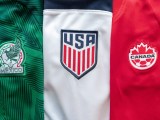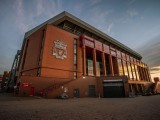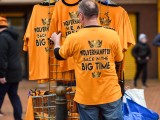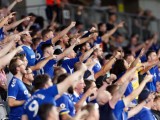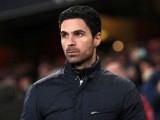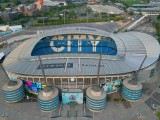Football fans in the UK will be more than familiar with Darren Fletcher, a lead commentator for BT Sport.
If you watch the UEFA Champions League on TV, he's pretty hard to miss. Some will also know Darren for his work covering boxing, NFL and even baseball, but little is known about the man behind the mic.
Ever wondered what preparation goes into covering a big European tie, how to get into the world of sports broadcasting, or what it's like interviewing your idols?
Darren was extremely generous with his time and shared with us some fascinating insights on the beginnings of his career, his favourite moments as a broadcaster, his take on social media and much more.
From walloping home runs, to shaking like a leaf in Brian Clough's office, to Jermaine Jenas crying, here is our exclusive interview with the one and only, Darren Fletcher:
Q. How did you first get into broadcasting?
"It was a complete fluke. It was more of a dream that became reality than a process that I went through."
A. I'd not done particularly well at school. I ended up dropping out and working with a couple of mates of mine, rebuilding the Lyceum Theatre in Sheffield. Our job was to put up suspended ceilings. I hated it. I'd always had a yearning that I wanted to do something involving sport for a job, but when I was at school, the careers people told me that it was a pipe dream.
My stepfather knew a guy that owned a gym, and the Sports Editor for the local radio station - Pennine Radio - trained at that same gym - a guy called Tony Delahunty. Tony had been instrumental in using his radio platform to help people get out of Valley Parade on the day of the Bradford Fire, he was a very experienced broadcaster, but he also had a PR company.
They wanted someone to be a runner on an event called the Sunlife Great Race, so off I went. During the course of the week, I was accidentally put to air by a radio station who I was filing copy to, so I had to do this kind of report. I don't think I'd like to listen to it now if I'm honest. Based on that moment, and the enthusiasm I showed during the course of the event, he offered me a job working within his PR company, based in the radio station in Nottingham, which was called Radio Trent at the time. It was a complete fluke. It was more of a dream that became reality than a process that I went through.
Q. When did you start rubbing shoulders with famous sports personalities, and were you a bit starstruck by anybody in the beginning?
"I was six weeks off the building site and sitting in an office with Brian Clough, sweating profusely and not doing a very good job."
A. The first interview I ever did was with Brian Clough. I was six weeks off the building site and sitting in an office with Brian Clough, sweating profusely and not doing a very good job. I think that was the moment where it all kind of became reality, because I'd stood on the terraces watching his team win cup competitions, and all of a sudden I was in the office asking the questions prior to a match against Manchester United. I remember the whole thing vividly, shaking like a leaf, very nervous. I had to wait about three hours for the privilege.
He completely took the p**s. I was like fresh meat I think, which he thoroughly enjoyed. I remember I'd written some questions down, and as I started to ask the first question, he just leant forward and got hold of my questions, screwed them up and dropped them on the floor, and that was when the sweating and the shaking really started. That was a big moment. I would say the teenager that walked into that office that day has never been as nervous or as starstruck in his entire life since. Everything I've ever done, from that point on, has felt easier in some way, shape or form, than that day did.
Q. Nowadays you're arguably best known for your commentary of the Champions League on BT Sport. As an English commentator covering those big European games, how much research has to go into being informed on those opposition clubs facing Premier League sides? You sound very across everything but surely you're not watching every Bundesliga game every week, for example?
"It's a moveable feast, it's a tapestry that gets woven as the season goes on."
A. No, and I wouldn't sit here and claim that I do. I have a responsibility, because on a Tuesday night and a Wednesday night I get invited into people's homes. Whether they like it or not, I open the door and go and sit on the settee in their front room and talk about the Champions League with them. So it's an absolute must that I have to be prepared for that night. You have an obligation to keep across all of the European leagues and know your stuff, and then you'll start to drill down on different aspects of the game that you're gonna cover. I think I've been fortunate enough that we've done the Champions League for quite a long time now, so you follow the competition as well, season upon season, so you've got the back stories, and you'll build up that knowledge over a period of time, from experience of being where you are. I think the key thing is that there are certain things that people would like to know and certain things they wouldn't.
I think you look at the narrative of the game as well. I'm bigger on the narrative rather than the minutiae, because it's what that 90 minutes is about. I don't feel the need to try and tell you at home that I know more about the right back than you do. That's not for me. What I'd like to try and do is have a conversation with you about the game that we're watching together. I don't profess to have any greater knowledge of European football teams than the people I'm broadcasting to. I just try and be as prepared as I possibly can for each situation, and the longer the Champions League tournament goes on, the more knowledge that you ultimately build, and we all learn together over the course of the season, and I think that's really important. It's a moveable feast, it's a tapestry that gets woven as the season goes on.
Q. One thing I discovered which was a bit out of left field, pardon the pun, was your baseball coverage. I'm not a big baseball fan, but when I was researching for this interview, I saw that you did this MLB broadcast on BT Sport. From what I saw, it sounded like you knew your stuff, knew all the jargon. Was that a tonne of research on your part for that one-off or are you actually a big fan?
"Nobody in the US has ever walloped a home run, but they have in England."
A. I'm a baseball fan. BT Sport has the rights to Major League Baseball. They'd never played a game overseas and they decided to bring the Yankees and the Redsox to London, so because I like American sport, and I do the NFL, the Superbowl and stuff, my boss said "Do you fancy doing the baseball?" and I said "Yeah, great. That'd be brilliant", and then reality hit me that I actually had to sit there and commentate on it, which I'd never done before. So of course I watched a load of baseball and I knew the terminology anyway, and was already following the season. So we all turned up that night, and Neil Duncanson from North One, who was the producer on the night, said "Listen, here's what we're gonna do. We're gonna turn up and we're gonna enjoy it, and if we enjoy it, the audience might enjoy it".
So everybody was nice and relaxed. I worked with a guy called Josh Chetwynd, who'd been on Channel 4 and is American and knows his stuff, so I'd got someone to lean on. So then I just called the game the way that I thought I should call it. So after Night One, of course you're thinking there's gonna be an avalanche of "Who's this guy? Where's the American fella?", but we got to the end of the game, and Neil said "Oh, the feedback's been really good!" and then we started getting requests in from media outlets in North America for this English commentator that's doing the baseball. They were interested in the terminology that I used for home runs, etc, because I used my language, not theirs. Nobody in the US has ever "walloped" a home run, but they have in England. They thought this was fascinating.
Another mad thing was, if you go to the end of that season, they did the top 50 plays of the year in Major League Baseball, and two of mine were in the top 25. There's all these calls, and then there's this idiot from England in the middle saying "walloped" and all this kind of stuff. It was crazy. Anyway, then Covid came, and we couldn't do it. But we're doing it again this year, so we're all back to the scene of the crime.
Q. It sounds like it worked out fantastically well. You mentioned expecting negative feedback but got positive. That leads on perfectly to social media. To what extent do you read stuff on social media and digest it? Do you get a lot of abuse online and does it affect you?
"I don't actually think social media even gives you a realistic sense of what is out there."
A. I have no interest whatsoever, none, genuinely. I have high standards that I set myself, and I know if I've attained them. I can only do the job that I can do. In an ideal world, everybody would like you, but they don't. The individuals who pay for the channel that I broadcast on are perfectly entitled to their opinion, because they put their hands in their pockets to pay for it, and I respect that. But you can't listen to it. I work for my bosses, they tell me if I'm doing a good job or not, I watch everything that I do, I know if I could do better, I don't profess to be the best commentator in the world for any sport. I do what I can do in the way that I can do it. I don't need people telling me that I've been brilliant or rubbish. I don't really think about it. It's not on my radar.
I go to all the football grounds that I can ever dream of going to, and when I meet supporters and football-lovers, we've all got one thing in common, we all worship what we're there for that day, whether you're a supporter and I'm a broadcaster, or whatever. I don't know any more about their club than they do. They know more about it than I do. And I respect that. And I never get abused or hear anything other than "Hello mate. You okay?" I don't actually think social media even gives you a realistic sense of what is out there.
Q. What would you say have been the highlights of your commentary career so far?
"I look to my right and I leave my gap for Jermaine to come in, and he's in tears next to me."
A. So, because I'm fortunate to do a multitude of sport, I've kind of got different moments in different sports. I do the NFL and I was fortunate to commentate the night Brady came back from an impossible situation in the Superbowl in Houston against Atlanta. I think he was down 28-3 and he came back and won it, and I think that might be the single most impressive performance by a sportsman I've ever had the privilege to work on.
The goal that Ronaldo scored in Turin for Real Madrid against Juventus was the moment where I thought my head was gonna blow off because the goal was so astonishing, and the reaction to him in the arena, from the Juventus supporters, not the Real Madrid supporters, was amazing. I'd never seen an entire stadium just rise and applaud someone for a goal against their team.
Then of course you get the obvious one, which is the two semi finals of the Champions League, on back-to-back nights. Liverpool on the Tuesday, Tottenham on the Wednesday, and I think I could do this job for another hundred years, which if you go by social media is the last thing anybody wants, and I'll never experience two nights quite like that.
I remember we did the game on the Tuesday at Anfield, and we all knew how it could possibly work, that Liverpool needed to score first, go in at half time without conceding a goal, and then work it out from there. Nobody was brave enough to say that was what was going to happen, we all just said that's what could happen. Then it happened and it was the most astonishing thing that, up to that point, I'd ever witnessed in a sporting arena.
...then we travelled to Amsterdam.
And I remember having a conversation with my wife the next morning, and she said "What do you think about tonight?" and I said "Well it's not gonna be like last night is it?" - I remember saying exactly those words. And I said, "I'm a bit concerned tonight that if Ajax score first, after the high of last night, we might need to try and keep the Tottenham supporters spirits up a little bit" because that would be the worst case scenario for them, going out in the Champions League. You know the devastation that the supporters are going through, so you've got to pick your words very carefully at that point.
And I remember, we sat there at half time, Jermaine Jenas and myself, and they're talking about the final, and they're singing Three Little Birds and Patrick Kluivert's banging it out, and Edwin Van Der Sar's going for it at the top of his voice, and one of the lines is "Don't worry about a thing", and I said to JJ "I'm not being overly optimistic here but I just think they've gone a little bit early here. There's 45 minutes to go".
So, with this is in my mind, I remember, they pulled a goal back, and for the first time on the night we heard the Tottenham fans, who were directly opposite us, and I said on the commentary at that point to Jermaine "They've heard the supporters for the first time tonight, and that's gonna mean a lot". At the other end, Lloris is making save after save. When they get the second goal, I remember saying on the commentary then "They were singing don't worry about a thing at half time, they've got plenty to worry about now" cause you felt the earth tipping on its axis in Amsterdam. Then, if you watch the move back again for the winner, every pass that Spurs play in that move is either a 50/50 ball or it's played in a manner that 7 or 8 times out of 10 somebody would miscontrol it or miss a pass. That was their time.
And when the goal went in, I had no idea what I thought, what I felt, it was the most unbelievable moment ever. All of a sudden I thought, "This is what Clive Tyldesley felt like when Solskjear scored!" because it was just totally unexpected, and you just saw the Ajax players just drop to the ground in unison. As a commentator does, you do your bit, you try and get your words right. In that position it's absolutely impossible, because you're just blurting out the first thing that comes to your head because you've exploded too. At this point I'm gone, with this high, this mega-high, and I look to my right and I leave my gap for Jermaine to come in, and he's in tears next to me. Now I'm thinking "I have to tell people this because this is mad" so I'm saying "Jermaine Jenas is in tears next to me" and I'm thinking "I hope he doesn't fall out with me for telling them" but all he can blurt out is "I can't believe it Fletch" through the tears, and at that point you're thinking "Dear God, if he feels like that, and they feel like that, what is everybody feeling like at home if you're a Spurs fan?".
What made that night even more unbelievably special was that we'd nearly lost Glenn that year, and Glenn was with us in Amsterdam that night. I adore Glenn, he was one of my heroes as a kid, he's on a pedestal, so to have Glenn with us that night to share it and be part of it, his team in a Champions League final, was one of the most special moments of my life I think.
The next day when I walked into the airport all I could hear was various stages of the goal being played by Spurs fans on their phones. It was so humbling. They're the moments when you realise what it means to people, and the fact that you can be a part of that in some small way and share it with them, that wonderful moment, it blows you away, it really does, it was such a powerful moment.
Q. You mentioned doing this job for another hundred years. You're still young. How long do you really want to do this for? What's the future look like for you?
"I hope the end's not gonna come too soon cause I'm having too much fun at the minute."
A. If I could control it, I'd do it for a long time, because I love it, and I always say to my wife "If I wasn't getting paid to do what I'm doing, I would be paying to be there to do it" if you get what I mean. I would like to do it for a long time. Obviously that's beyond my control to a certain extent. I look at people like Martin Tyler. Martin has defied a lot of things to achieve his longevity, and to still maintain the ability that he does now is astonishing really. He's a role model for someone like me. I would like to keep doing it, because I love it.
I feel like the luckiest guy in the world to do what I do, and I don't feel like I work. We all have bad moments where you're tired or you're schedules hard, but most of my friends have jobs and I don't. I don't have a job. I'm very fortunate to do it, and I appreciate and respect the opportunity that I've been given. To carry on and do that for the foreseeable future and beyond is a big ambition of mine. Somebody might give me a little tap on the shoulder at some point and say "Look, enough's enough. We can't put up with you any longer" but I just hope that that's quite a few years down the road, I hope the end's not gonna come too soon cause I'm having too much fun at the minute.
Stick around for more exclusive interviews and Sports Streams News from Sporticos.

